In our increasingly interconnected digital world, privacy and security have become paramount. The world of VPNs, or Virtual Private Networks, has expanded rapidly in response to these concerns, with the best VPNs leading the way. They encrypt users' internet data, preventing prying eyes from seeing their online activities. However, as threats to online privacy have advanced, so have the solutions aimed at counteracting them. Enter the Double VPN (also known as Multi-Hop VPN): a technology that takes the security and privacy advantages of standard VPNs to the next level. In this article, we'll explore everything you need to know about double VPN in 2025.
What Is A Double VPN?
A double VPN, also known as a multi-hop VPN, is a technique that adds an extra layer of security and privacy to the traditional VPN setup. While a standard VPN routes your internet traffic through a single fastest VPN server, a double VPN takes it a step further by encrypting your data twice and routing it through multiple VPN servers in different locations before it reaches its final destination. This multi-hop process creates a chain of encrypted connections. So, even if someone could intercept your data at one point, they'd only see encrypted data from the second VPN server rather than your original data or IP address.
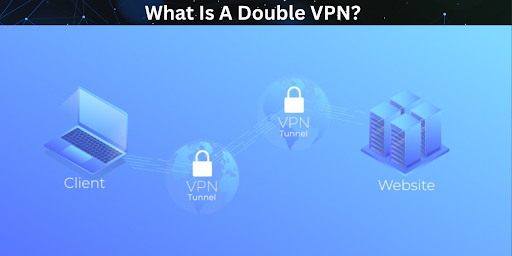
Types Of Double VPN
There are different types of double VPN configurations available, each with its own setup and benefits. The most common types include:
-
Cascade:
This setup involves using two VPN servers provided by the same VPN service. It ensures that your traffic passes through multiple servers within the same network, providing an additional layer of encryption and obfuscation.
-
Nested:
In this configuration, two separate VPN providers are used consecutively. Your internet traffic is first encrypted and routed through one VPN server and then passed through a second VPN server provided by a different VPN service. This approach adds an extra level of anonymity, as your online activities are distributed across two different VPN networks.
Benefits of Double VPN
Utilizing a Double VPN service can provide a plethora of benefits to individuals who are keen on ensuring the highest level of online privacy and security. Here are the key benefits:
-
Enhanced Security:
Double VPN provides an added layer of security by encrypting your data twice and routing it through multiple servers. This makes it extremely difficult for anyone to intercept or decrypt your online communications.
-
Increased Anonymity:
By routing your internet traffic through multiple servers in different locations, double VPN helps to obfuscate your real IP address and location. This makes it harder for websites, advertisers, or surveillance entities to track your online activities.
-
Bypassing Geographical Restrictions:
Some online content and services are restricted to specific geographic locations. With a double VPN, you can mask your actual location by appearing to connect from a different country, allowing you to access geo-blocked content and services.
-
Protection against Network Surveillance:
Double VPN protects you against network surveillance by making it significantly more challenging for surveillance entities to monitor your online activities. The multi-hop process ensures that your traffic is distributed across multiple servers, making it harder to trace back to you.
Drawbacks of Double VPN
While a double VPN can offer an additional layer of security, it's important to understand its potential drawbacks. These downsides can influence the decision of whether to use a double VPN or stick with a single-hop solution.
-
Reduced Internet Speed:
The use of multiple VPN servers and encryption layers in a double VPN configuration can result in a slower internet connection. Each hop introduces additional latency, which can affect the overall speed of your online activities.
-
Increased Complexity:
Setting up and configuring a double VPN requires more technical knowledge compared to a standard VPN setup. It may involve using multiple VPN services, configuring different protocols, and ensuring compatibility between the VPN providers.
-
Limited Availability:
Not all VPN providers offer the option of a double VPN. Even those that do might only provide the service on certain server locations. This can limit your choices when it comes to selecting a VPN provider.
-
Higher Costs:
In some cases, utilizing a double VPN may incur additional costs. This could be due to the need for two separate VPN subscriptions or because the double VPN feature is part of a more expensive pricing tier.
Double VPN: Overkill or Essential for Online Privacy?
The question arises: Is double VPN overkill or essential for online privacy? The answer depends on your specific needs and the level of privacy and security you desire. For the average internet user, a standard VPN should be sufficient to protect their online activities. However, if you engage in highly sensitive activities, a double VPN can provide an additional layer of protection. It includes:
-
Whistleblowing:
Whistleblowers often handle sensitive information that could lead to significant repercussions if traced back to them. A double VPN enhances their online anonymity, offering an extra security layer that could be crucial in keeping their identity concealed.
-
Journalism in Repressive Regimes:
Journalists working under oppressive regimes where internet censorship and surveillance are rampant can benefit significantly from a double VPN. The double encryption ensures their digital footprints can't be traced, protecting both their work and personal safety.
-
Accessing Restricted Content:
A double VPN can be beneficial for those who regularly need to bypass geo-restrictions to access the content. By routing traffic through two servers in different locations, it makes it even harder for authorities to track these activities.
-
Safe Access to Websites:
For individuals who need to access potentially risky websites, a double VPN can provide an additional safety layer. It protects against tracking cookies, malware, and other online threats by ensuring the user's real IP and location remain hidden.
-
Political Activism:
Activists, particularly those in regions with strict government surveillance, can benefit from using a double VPN. It offers an additional encryption layer, making it more difficult for their online activities to be monitored or traced back to them.
-
Public Wi-Fi:
Public Wi-Fi networks are notorious for their lack of security. A double VPN can provide a significant security boost when using these networks, preventing hackers from gaining access to your personal information.
Best VPNs With Double VPN
-
Private Internet Access (PIA):
It is known for its strong security features and user-friendly interface. Private Internet Access (PIA) offers a feature called "Multihop" which is essentially a double VPN functionality. It allows you to route your internet traffic through multiple servers in different locations, adding an extra layer of encryption and anonymity. This feature enhances your online privacy by making it harder for anyone to trace your online activities back to your original IP address. PIA operates a vast network of servers globally, ensuring reliable and fast connections for its users.
-
ProtonVPN:
ProtonVPN offers a feature called "Secure Core" that serves as a double VPN. When you enable Secure Core, your traffic is first routed through multiple servers in privacy-friendly countries before reaching the final destination. This ensures that even if one server is compromised, your data remains secure due to the multiple layers of encryption and routing. ProtonVPN also has a strict no-logs policy and provides strong security measures, making it a great choice for privacy-conscious users.
-
Hide.me:
Hide.me is another VPN provider that offers double VPN functionality. With its "Cascading" feature, you can create a multi-hop VPN connection by selecting multiple VPN servers to route your traffic through. This feature adds an extra layer of encryption and anonymity, making it difficult for anyone to track your online activities. Hide.me operates a global network of high-speed servers, ensuring fast and reliable connections for its users. It also provides strong security features, including AES-256 encryption and a strict no-logs policy, to protect your online privacy.
Decoding Double VPN and VPN Over VPN: How Do They Differ?
While Double VPN and VPN Over VPN both involve routing your traffic through two servers, there are significant differences between the two that impact their usability, security, and cost.
-
Multiple Providers vs. Single Provider
The primary difference between Double VPN and VPN Over VPN lies in the number of providers involved. A Double VPN refers to the use of two servers from the same provider. In contrast, VPN Over VPN involves connecting to two servers from different VPN providers, effectively running two VPNs simultaneously. This not only gives users a broader server selection but also lifts the restrictions imposed by using a single provider.
-
Increased Control Over Geolocation
One advantage of VPN Over VPN is the enhanced control over your virtual geolocation. You're not limited to the server pairs offered by a single provider and can choose any location each VPN offers.
-
Enhanced Security
Using VPN Over VPN is theoretically safer because the servers are owned by different companies. If one provider is compelled to disclose data about your online activity, your privacy remains protected as they don't have access to the other server's information. This security level is further heightened when using providers based in different jurisdictions.
-
Compatibility Considerations
Despite its advantages, VPN Over VPN has a significant drawback: the two VPNs must be compatible. If they aren't, they may interfere with each other and disrupt your connection. A workaround is installing one VPN on your router and another on your device, but this can be complex, and not all VPNs are router-compatible.
-
Higher Costs
VPN Over VPN is typically more expensive than a Double VPN. A double VPN requires a subscription to a single provider, while VPN Over VPN necessitates subscriptions to two or more providers, increasing the overall cost.
In short, both Double VPN and VPN Over VPN enhance online privacy and security but in slightly different ways. The choice between the two depends on your specific requirements, technical expertise, and budget.
Step Up Your VPN Game: Configuring Two VPN Services for Maximum Protection
Achieving maximum online security sometimes necessitates the use of two different VPN providers simultaneously - a scenario often referred to as a VPN over VPN or a double VPN. While the setup can be a bit complex, the following guide provides a roadmap to help you navigate through the process.
Step 1: Install a Virtual Machine on Your Device
The first step in setting up a double VPN is to install a virtual machine (VM) on your device. A VM is a software emulation of a physical computer, running an operating system (OS) and applications just like a real computer. Free virtualization tools such as Hyper-V or Virtual Box can be used for this purpose. Once installed, you can then set up a second operating system within this virtual machine. Note that the OS on your VM doesn't necessarily have to match the one on your actual device.
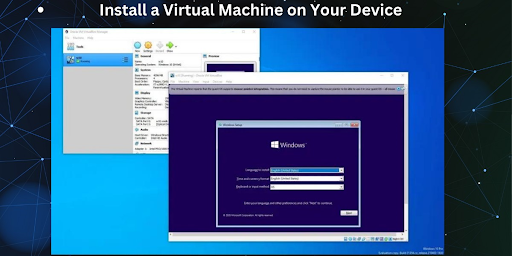
Step 2: Install VPNs on Both Systems
After setting up your VM, the next step is to install your VPN applications. You'll need to install your primary VPN on your actual device and the secondary VPN within the VM. Remember that each VPN installation might be counted as a separate device by your VPN providers. So, ensure you're within the device limit permitted by your VPN subscriptions.
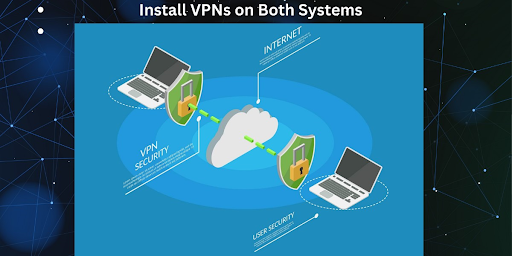
Step 3: Establish Your Double VPN
Once both VPNs are installed, you can then create your double VPN. Start your primary VPN and connect to a server in one location. Following this, power up your VM. If you check your IP within a browser on the VM at this point, it should reflect the location of the first VPN server. Next, launch the second VPN within your VM and connect to a server in a different location.
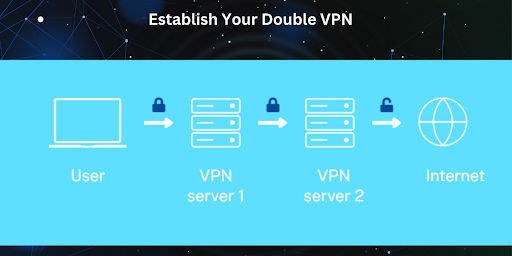
Step 4: Use Your Double VPN
After the setup, any traffic originating from your VM will first pass through the server of the primary VPN and then the server of the secondary VPN. This means your online activities are doubly protected, significantly enhancing your online security and privacy.
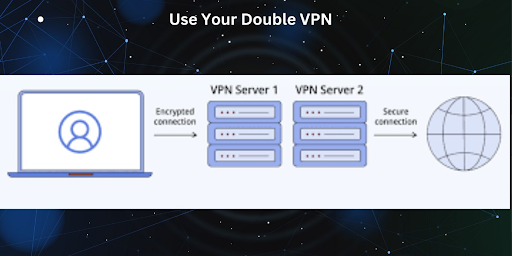
Setting up two VPN providers simultaneously can provide superior protection, particularly when handling highly sensitive data. Although the process might appear complex, the added layer of security could well be worth the extra effort.
When Should You Use a Double VPN?
Double VPN is a feature that adds an extra layer of security by routing your internet traffic through two VPN servers instead of one. While it provides enhanced security, it may not be necessary or beneficial for every VPN user.
Here are some instances where using Double VPN is recommended:
-
Bypassing website restrictions in highly-censored countries:
In countries with strict internet censorship, using a Double VPN can help overcome restrictions imposed by the government or other entities. By encrypting your traffic through multiple servers, Double VPN can make it harder for authorities to detect and block your online activities, allowing you to access blocked websites and content.
-
Protecting your data against advanced cyberattacks:
If you are concerned about advanced cyber threats or targeted attacks, Double VPN can provide an additional layer of protection. By encrypting your data twice and routing it through different servers, it becomes significantly more difficult for attackers to intercept and decipher your sensitive information.
It's important to note that enabling Double VPN may result in slower connection speeds due to the increased encryption and routing. Therefore, it may not be necessary or ideal for casual VPN users who primarily seek privacy and security without facing specific threats or restrictions.
When You Shouldn’t Use a Double VPN?
Using a VPN can introduce some degree of slowdown due to the increased distance your data has to travel. This issue becomes more pronounced when using Double VPN, as it involves routing your traffic through an additional VPN server.
As a result, there are certain situations where the added layer of protection provided by Double VPN may not be beneficial. Here's a summary of when it's not recommended to use Double VPN:
Streaming region-restricted content (e.g., on Netflix): Streaming services like Netflix often employ geolocation techniques to enforce content restrictions based on the user's location. When using Double VPN, the multiple server routing can cause conflicts with these platforms, leading to difficulties in accessing region-restricted content.
Gaming or running other high-bandwidth applications: Online gaming and other high-bandwidth applications require a stable and fast internet connection. The additional encryption and routing involved in Double VPN can introduce latency and reduce bandwidth, resulting in a suboptimal gaming experience.
Torrenting large files or engaging in other P2P-based activities: Torrenting and other peer-to-peer (P2P) activities already involve a high volume of data transfer. Adding the complexity of Double VPN can further slow down the connection and impact the overall torrenting experience.
In these situations, using a single VPN connection without the additional layer of Double VPN is typically more suitable. It allows for faster speeds and better compatibility with streaming services, gaming, and P2P activities.
The Bottom Line
As privacy concerns continue to grow in the digital age, the use of a double VPN or multi-hop connection has become increasingly relevant. Double VPN provides enhanced security, increased anonymity, and the ability to bypass geographical restrictions. However, it is important to consider the potential drawbacks, such as reduced internet speed and increased complexity in configuration.
Ultimately, the decision to use a double VPN depends on your specific needs and the level of privacy and security you require. By understanding the benefits and drawbacks of double VPN, you can make an informed decision to protect your online activities in 2025 and beyond.
Ready to enhance your online security? Visit VPN Guide for detailed reviews and comparisons of various VPNs to find the solution that fits your needs best.

